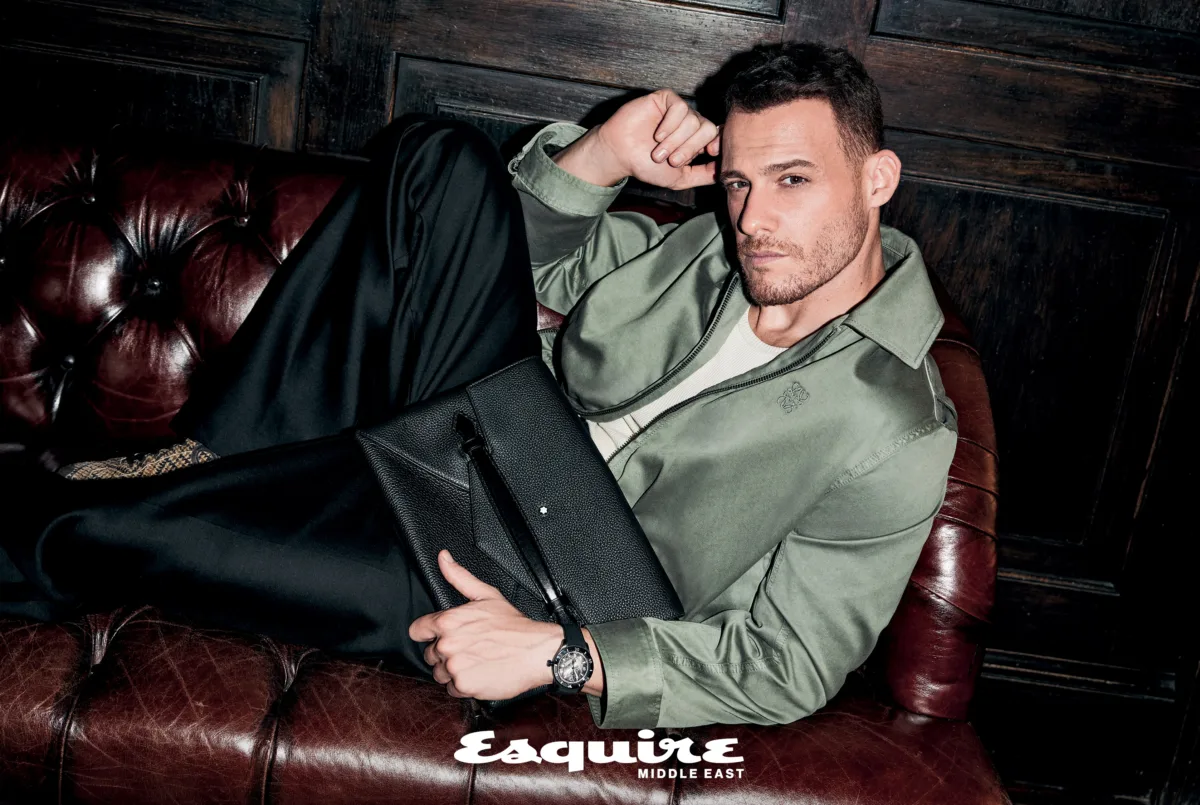On the night before the official start of Men’s Fashion Week in Milan, the lobby at the Hotel Principe di Savoia is bedlam. It is 7pm and the place is a hive of activity—fabulous-looking guests are checking in with a minimum 3:1 ratio of luggage; while unmistakable groups ofstylists, handlers, influencers and PRs are nervously buzzing about, checking their phones as much as they are checking their mirrors. There’s a man in an oversized coat, determined to make a fashion statement regardless of the seasonably warm June weather. Fashion Week is peacock season, and it makes for prime people watching. But even the most casual of observer would have made a note of Kerem Bürsin.
Wearing jeans, a knitted polo and loafers, he walks into the fuss on a wave of calm. Relaxed, and with the kind of alluring charisma that draws people’s attention. Simple without pretension. Stylish without trying.
We’re meeting for an intimate dinner nearby to celebrate his newly announced role as Montblanc’s regional brand ambassador for the Middle East, India, Africa, and Turkey. It’s the first time we’ve met, and while I already know the actor from his mega-hit Turkish series Sen Çal Kapımı [Love Is in the Air (2020)]—which propelled him to stardom across our region—I was immediately taken aback by his flawless English accent as he greets me with a smile, hand shake and a “Let’s go.”
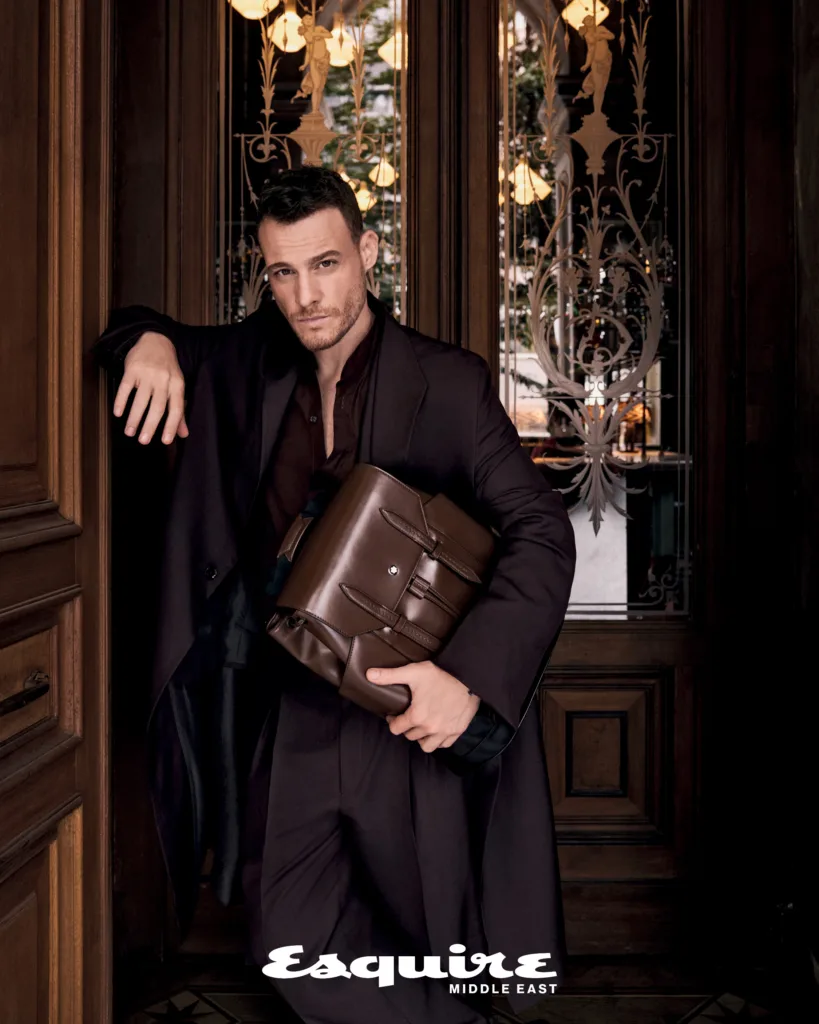
To reiterate, Kerem Bürsin is big deal. His leading man good looks, sense of sincerity, wide scope of acting ability, and tangible charisma has made him not only one of the most in-demand film and TV stars in Turkey, but across the Middle East too. But it wasn’t until one of our Instagram posts of him drew half a million views from Spanish accounts—with messages also pouring in from Latin America—that I understood the scale of his reach. This wasn’t regional stardom; Bürsin’s appeal was global.
A couple months later, I’m on a flight to Istanbul for a photoshoot with Bürsin for Esquire Middle East. Thanks to a re-routed flight path due to a technical fault, getting there was a nightmare…but more on that later. Choosing Istanbul was not a random decision. The city itself is a metaphor for Bürsin: a bridge between continents and cultures. It connects Europe and Asia across the Bosphorus and, much like Bürsin himself, it carries multiple accents in one voice.
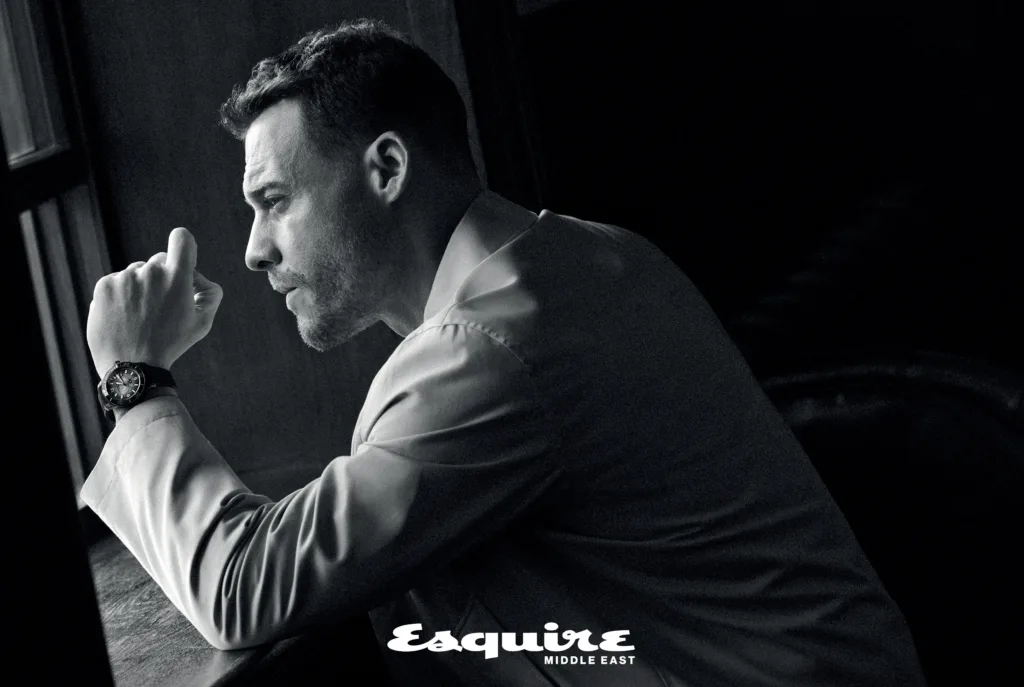
Upon landing, I was greeted by a massive billboard of him at the airport, fronting a national telecom campaign. People were stopping to take photos of themselves infront it. If there was a reminder that his appeal is not just hype, this would be it. So, when we finally sat down together, the starting point seemed logicial: What’s your appeal?
“I don’t know,” he laughs, brushing it off with that trademark humility. “I’d like to hope it’s the work I’m doing. At the end of the day, it’s not me that’s supposed to be liked; it’s the work we’re putting out there.”
It is a hot, cloudy day in Istanbul. But Kerem Bürsin is in a good mood. “This is perfect weather for a shoot,” he said to no one in particular as we walk toward the historic steps of Soho Clubhouse at Palazzo Corpi, a 19th-century Italianate mansion in the centre of the Beyoğlu district. Bürsin is on a rare day off from shooting a project that he is working on, but he clicks straight into gear walking up and down the steps to nail the shot, wearing a pyjama-style look under a statement coat. He has the energy of a superstar who had just rolled out of bed, thrown on a coat, and is ready to conquer the world.
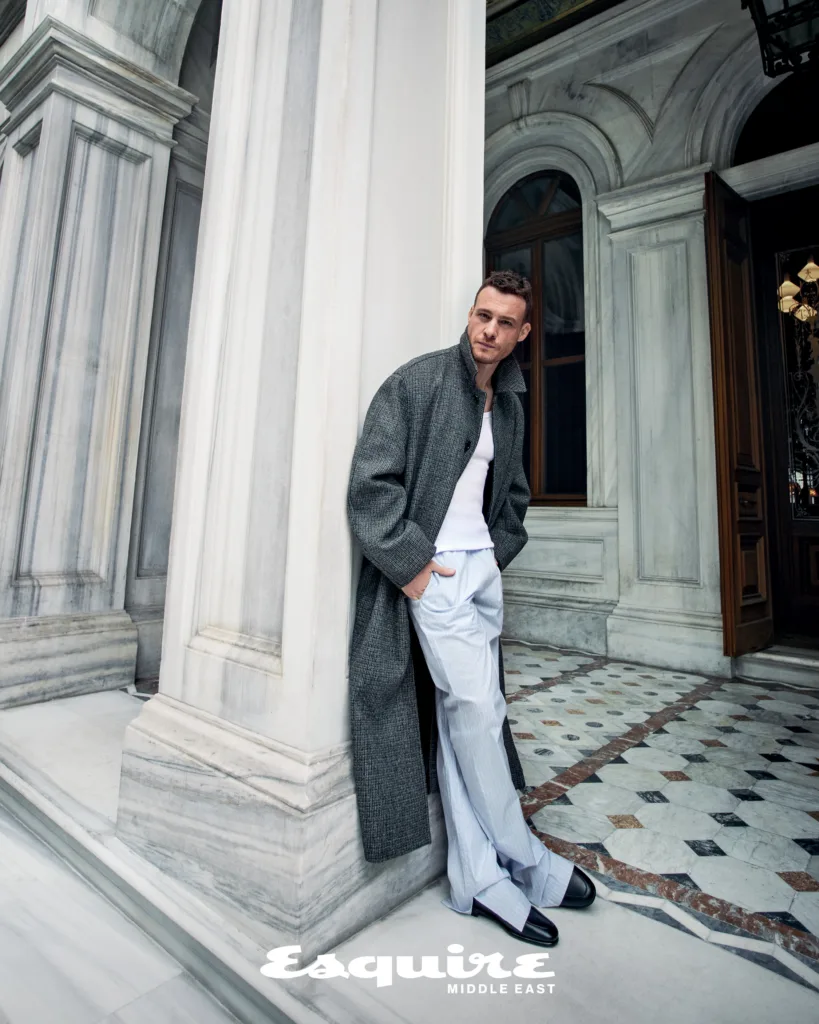
Kerem Bürsin on His Upbringing
Later I learn that, that adaptability, that ease, is the result of an upbringing which shaped him in profound ways. Growing up Kerem Bürsin lived in seven different cities, from Jakarta and Boston to Dubai and Abu Dhabi.
“It’s definitely the reason why I am who I am. Growing up in so many different countries taught me to adapt quickly, but it also made me realize that everywhere I lived became home and each home stayed with me,” he reflects. “Every city leaves an accent on your soul; you start carrying pieces of them wherever you go.”
Yet this nomadic life came with trade-offs.
“It’s difficult to maintain long-term relationships or childhood friendships when you’re constantly moving. I don’t have childhood friends the way many people do. My roots are everywhere. The blessing is that you see the world, understand humanity, and know that we’re not as divided as we think,” he adds.
This travelling childhood shaped not only his personality but his outlook on life. Kerem Bürsin has learned that identity isn’t fixed; it’s a mosaic built from the sum of every place he has lived. “The more borders you cross, the more you realize home is less about geography and more about people and moments,” he says. “Moving from country to country is like collecting new versions of yourself – you look back and see how many lives you’ve lived.”
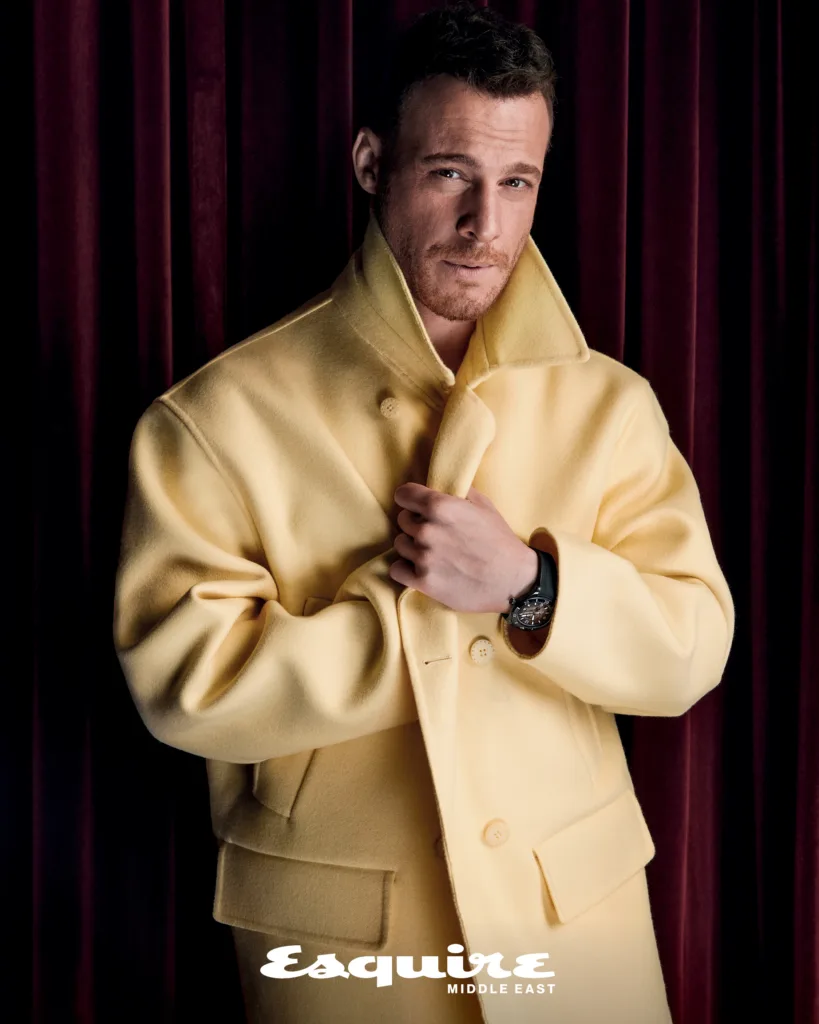
Multilingual and multicultural, Kerem Bürsin shifts between English and Turkish instinctively. “I dream in English mostly, but after 15 years in Turkey, Turkish sometimes takes over. Being bilingual is like carrying two worlds in your head at once. I’m proud to be Turkish and with the expat life, you have more nationalism going, because that’s what you’re wearing wherever you go.”
This global exposure naturally fuels his acting. “Experiencing life, constantly shedding a part of your skin, helps you understand yourself and translate that into performance,” he says. “Acting is about using your emotions and experiences to connect with an audience. That’s what makes it meaningful to me.”
His love for performance started early. He loved movies as a child. Robin Williams, Jim Carrey, Peter Sellers were heroes. For him, movies being a universal language, something everyone could understand, no matter where you came from.
Though sports and other interests distracted him for a while, a high school teacher reignited his passion. They got him into acting classes, teaching him about character psychology, how to understand wants and needs. That’s when he knew he wanted to be an actor, no matter the risk.
“The more borders you cross, the more you realize home is less about geography and more about people and moments”
Kerem Bürsin
Acting, for Bürsin, is a natural extension of this journey. “It’s one of the few art forms where you, your gestures, your voice all becomes part of the art. You’re translating your experiences and emotions into something tangible that connects with an audience. I try to approach every role, and life itself, with humility because no matter where you are, people can always feel whether you’re genuine.”
Early start
We later enter the Soho House chancery room, its wood-panelled walls, tall windows and leather sofas exude drama and history. As I grab a wooden chair to move it out of the way, he starts laughing. Confused, I look at him and ask: “what’s happening?” He continues to laugh and tells a story about one of his earliest auditions in LA.
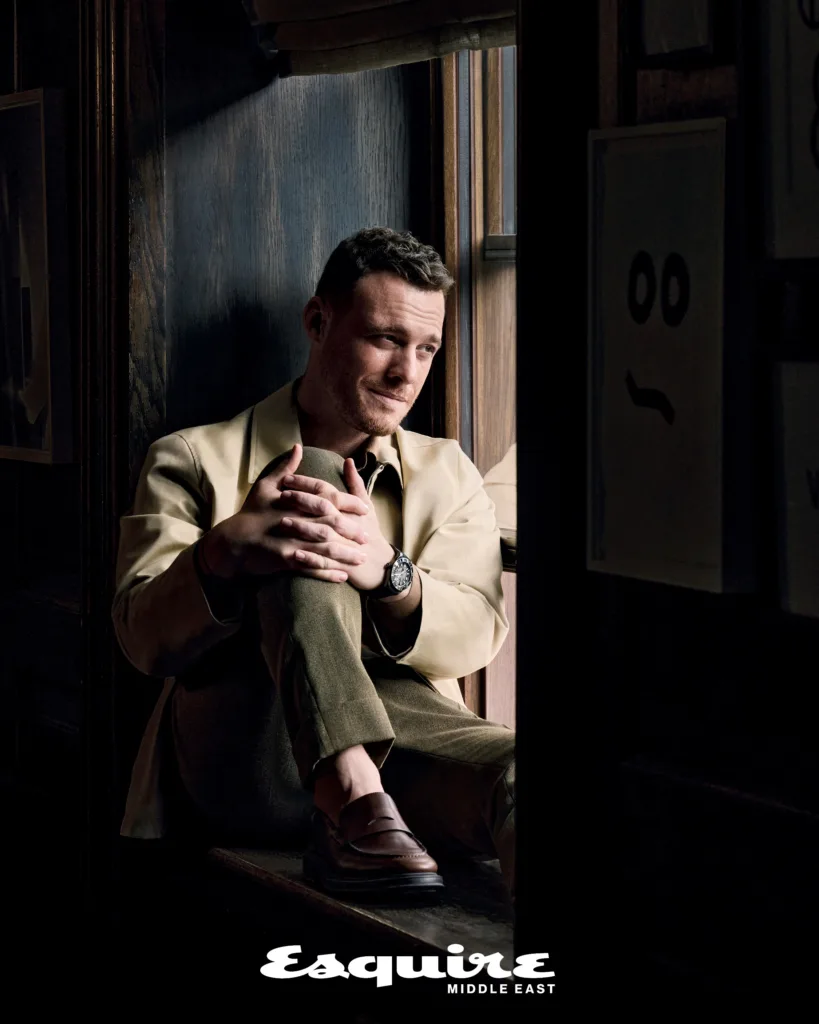
“I went into this audition for a Roger Corman film. I didn’t know who Corman was at the time. I just went in, and right away I realized this was a massive opportunity I’d probably never get again. Roger was in the room, his wife Julie, the producers… everyone.” He explains how his nerves quickly took over.
“I was ruining it! I forgot my lines the second we started. In an audition, the worst thing you can do is say, ‘Oh, I’m sorry, can we do it again?’ But that’s literally what I did. And I messed it up again!” Starting to getting flustered, when Bürsin stumbled a third
take, he reacted and kicked a chair (similar to the one I had moved) before continuing. “I guess that’s what Corman liked,” he says. The chaos of that audition landed him his first roles in Corman’s Sharktopus (2010) and later Palace of the Damned (2013).
But after a few years in Los Angeles, Bürsin decided to return to Istanbul. Shortly after, his career in Turkey took off. Within months, he landed the lead role in Altan Dönmez’s TV show Günesi Beklerken [Waiting for the Sun (2013–2014)], which became a cultural phenomenon in Turkey and surrounding countries. That was followed by Muhtesem Ikili [Double Trouble (2018)], an adaptation of the American movie Tango & Cash; then the hugely successful romantic comedy series Aynen Aynen [Same Thing (2019–2021)], among many others.
Love for Comedy
Kerem Bürsin remains very passionate about comedy. “There’s something deeply human in comedy that makes people laugh and think simultaneously. That’s what I want to do—make people smile, feel alive, even in small ways. But sadly we don’t have a Robin Williams today,” he adds.
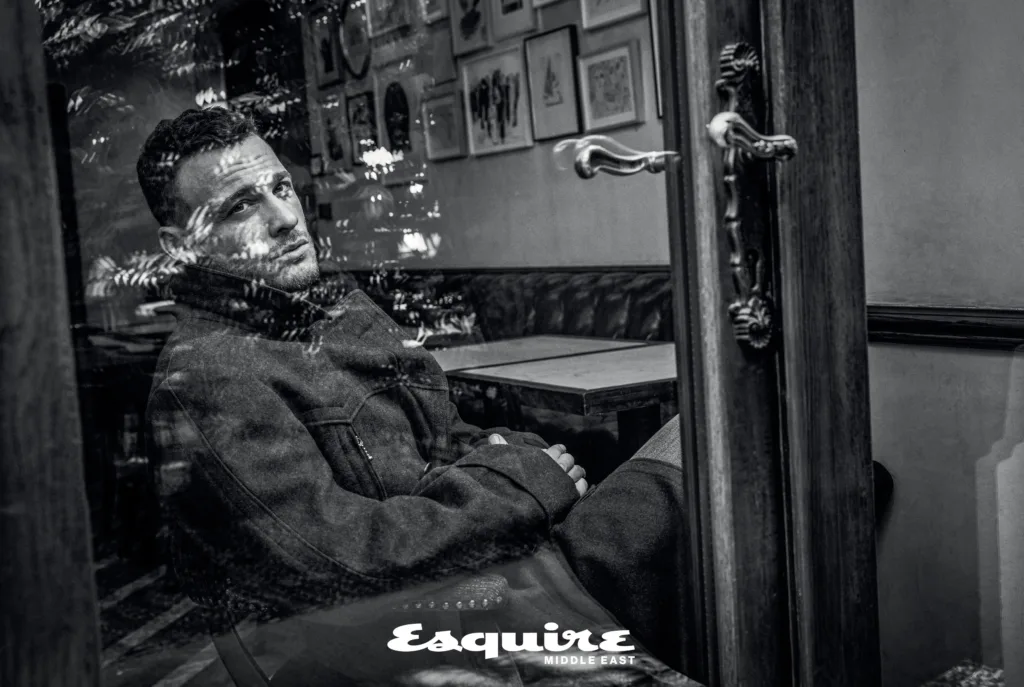
Although he excelled in comedy, he is starting to feel “all comedy-ed out.” His new Netflix comedy Platonik: Mavi Dolunay Otel premieres on September 18. But now he’s in full production mode, filming a new Turkish drama series Çarpıntı (‘Palpitation’ in English).
The project marks a shift in mood.
He’s doing something more serious, more dramatic. It’s tackling subject matter that he thinks is very relevant and important to his country. “I can’t really disclose what it’s about yet, because it’ll come out later, but I think it’s important,” he says with excitement. “The roles that are most similar to me tend to be boring. The great ones are opportunities to explore parts of yourself that you’ve suppressed or never knew existed. That’s the joy of acting.”
Despite all the success, Kerem Bürsin doesn’t shy away from pointing out the challenges of Turkish TV. “In Turkey we produce so much content, but we don’t have a real film industry – it’s mainly just a soap opera TV industry. For all this output, not a single Oscar nomination. No globally celebrated hits. That has to change,” he says.
But even within those boundaries, he sees opportunity, viewing the constraints as a push toward greater creativity and a reason to tackle new topics. He remembers writing an ambitious, unconventional script that no one wanted. He had taken the project everywhere, but people were not interested—not because it was bad, but because it was different. In the end, he decided to write a love story instead, but with a twist so that the ending landed like a slap in the face. His dreams stretch further. “This is the perfect region to do sci-fi. The Middle East is rich with stories that could merge archaeology, history, and imagination. We are so rich to create amazing stuff. Unfortunately, I think regionally we don’t know how to use the riches we have.”
Passion for writing
Later, as we moved into the screening room, Bürsin – dressed in an all-white outfit – looked sharp yet relaxed. He sat alone among 51 empty red velvet armchairs, Montblanc pen in hand, as if ready to write a review of his own performance. But in fact, we learn that he never watches his shows. His focus is on creating, not replaying. Even the Arabic adaptations of his work remain unseen, leaving him detached from how audiences abroad experience his performances.
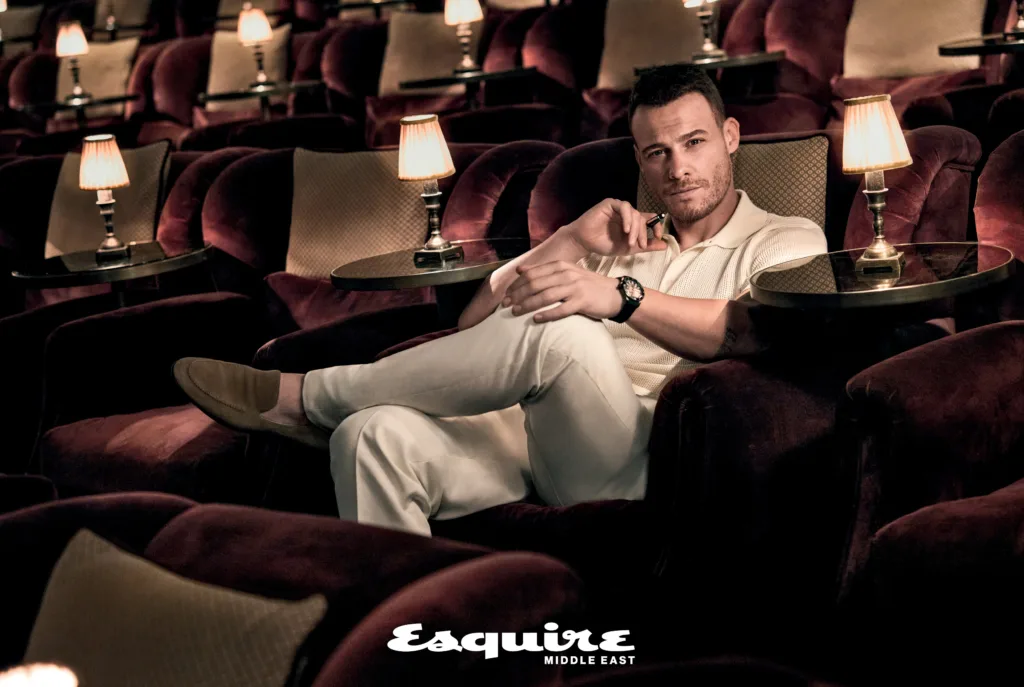
In between lenses changes, he joked about my flight from Dubai, which he’d overheard me telling the crew had been terrifying due to a mid-air technical error. “Dude, we should bring our own parachutes on the plane just in case,” breaking into laughter. His humour revealed not only wit but the scale of his imagination.
Because at his core, Kerem Bürsin is also a storyteller. “Writing have always been my compass,” he says. For him, writing is one of the most romantic things a human can do. “It’s permanent. It’s art. Good handwriting, letters, journals – they carry a weight that nothing else does.” He remembers reading about someone who discovered a letter sealed in a bottle from 1826, and was blown away by the idea that words on a piece of paper could outlive their writer. That’s why his partnership with Montblanc is no accident.
Journaling became his way of making sense of the world. “Since I was a kid, I always kept journals. Especially while traveling, I’d write on planes about where I was going, what I was feeling. Writing became my best friend. In acting, you face so many rejections—you’re told ‘no’ constantly. Writing was the one thing I could control.”
“My dad had a Montblanc pen, and I remember thinking, when I sign something with this, that means I’ve made it. It wasn’t about money, but about quality.” Today, when he began collaborating with the brand, the connection felt almost poetic. “I still carry a Montblanc passport holder my dad gave me years ago. It’s one of those things you look at and think, wow… somehow, this all came full circle.”
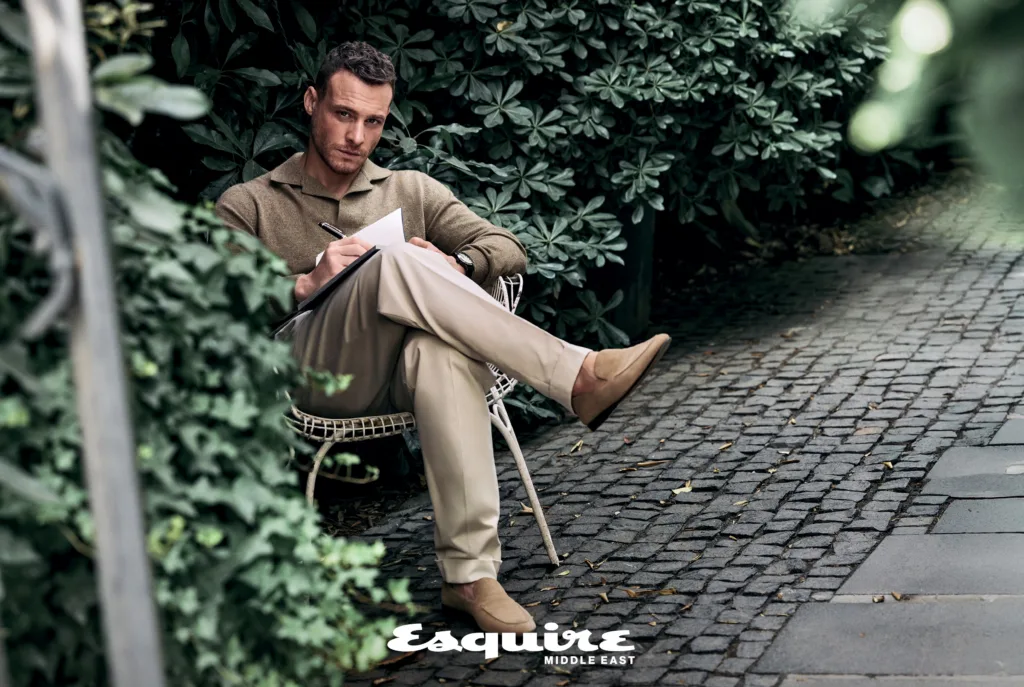
Bürsin also aspires to direct, driven by the desire to elicit unexpected performances. He believes that directors often focus too much on technical aspects and overlook the actor, and in our region, navigating egos is a major challenge. For him, being an actor means understanding that your primary responsibility is to take direction. He also sees a shortage of directors and writers. “That’s why I started writing. Because for me, it’s not just about how I do as an actor. It’s about what this industry needs to do well,” he says.
Late in the afternoon, as the shoot continued in the garden, two women passed by and asked for a photo. Kerem Bürsin gladly accepted. The way they walked away smiling was a beautiful reminder of his impact. Curious, I asked if he always agrees. He leaned back for a moment, thoughtful, then smiled. “If I’d want a photo with someone I admire, why would I ever say ‘no’ to a person who asks the same from me?”
Beyond the screen, Kerem Bürsin is a vocal advocate for change. He’s a UNICEF Goodwill Ambassador and a UN HeForShe Ambassador for gender equality, recently honored with the Starlite Foundation’s Influence Award for his efforts. “The planet isn’t doing well,” he says bluntly. “We have to care, not just for ourselves, but for humanity as a whole.” His philanthropic work isn’t a sideline; it’s a reflection of the global citizen he’s become.
After the shoot wraps in Istanbul, we’re sat at a table Cecconi’s restaurant, Bürsin is looking through the window—a quiet moment to collect his thoughts. For a man who has lived a lifetime in fragments—seven cities, countless roles—he seems to be searching not for
a destination, but for the next starting point. “It’s funny, I feel like everything is really starting now,” he muses, reflecting on a journey that has taken him from a child of the world to a global screen idol. “We’re constantly shedding parts of ourselves and becoming something else.” His life is a testament to curiosity, a journey fuelled by a love for getting lost in the quiet hours of an unknown city. This is the heart of his appeal: not the fame, but the soul of a traveller who finds home in the journey itself.
He is a modern-day romantic, a storyteller in motion, who—by his own account—is forever in the process of becoming something else.
Photography by Emre Güven / Styling by Polina Shabelnikova / Talent Stylist: İnan Kirdemir / Make-Up: Hazal Melis Öcal / Hair: Yıldirim Bozüyük / Senior Producer: Steff Hawker / Production: C/UNIQUE / Talent Management: Günfer Günaydın and Yaren Avcıoğlu / Photographer’s Producer: Belce Türker / Photography Assistants: Ömer Çetiner and Can Karataş / Styling Assistants: Aynur Efir and Yelit Kokal
